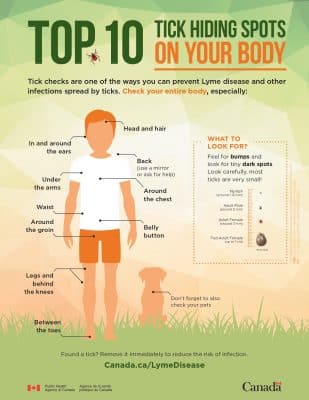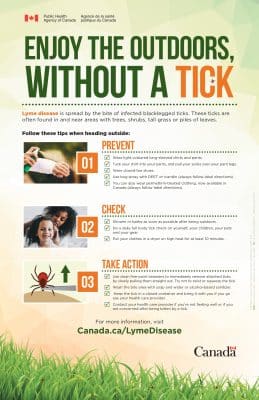Ticks & Lyme Disease | Learn How To Protect Yourself
Mosquitoes are not the only insects that can make your life difficult! Beware of tick bites that can transmit Lyme disease, a disease that can lead to complications if it is not detected in time. Lyme disease is caused by the bite of infected blacklegged ticks, which thrive in wooded areas. Tick bites are usually painless, and most people do not know that they have been bitten.
How Lyme disease spreads
Lyme disease is caused by a bacterium called Borrelia burgdorferi, which is spread through the bite of infected blacklegged ticks. Infected blacklegged ticks need to be attached for at least 24 hours in order to transmit the bacteria that causes Lyme disease.
Most people get Lyme disease after being bitten by:
- nymphs, which are about the size of a poppy seed
- adult female ticks, which are about the size of a sesame seed
You may not notice a tick bite because ticks are tiny and their bites are usually painless.
Not all blacklegged ticks carry the bacteria that causes Lyme disease. Blacklegged ticks are infected with the bacteria when they feed on infected animals like:
- deer
- birds
- rodents, such as white-footed mice and chipmunks
People and other animals can get Lyme disease when an infected tick feeds on them for long enough to transmit the bacteria.
Preventing tick bites and Lyme disease
There’s currently no Lyme disease vaccine available for humans. However, there are clinical trials taking place in Europe and the U.S.
The best way to protect yourself from tick-borne diseases is to prevent tick bites. Check your provincial public health authority to find out where infected ticks are most likely to be found.
Risks of getting Lyme disease
You should always take precautions against tick bites when taking part in higher-risk activities, such as:
- working in habitats suitable for ticks, such as:
- parks
- forestry
- agriculture
- participating in recreational activities where ticks may be present, such as:
- hiking
- golfing
- hunting
- camping
- gardening
- bird-watching
- fishing (from land)
Source: Public Health Agency of Canada | Government of Canada

Connexions Resource Centre promotes the health, social wellbeing and vitality of the English-speaking community through empowerment, participation and collaboration within the Outaouais.
Main Office:
Satellite Offices:
Shawville: 530, rue Main, Shawville, Qc, J0X 2Y0
Wakefield: 721, chemin Riverside, Wakefield, QC J0X 3G0




